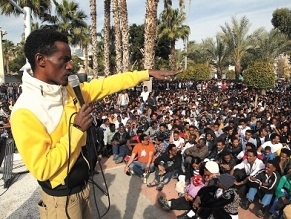|
World Jewish News

Demonstration in Tel Aviv's Levinsky Park on Tuesday | Photo credit: Gideon Markowicz
|
African migrant demonstrators bring protest to Jerusalem
08.01.2014, Israel "If we are a part of the problem, then we're also a part of the solution," Moatassem Ali said on Tuesday. He is one of the main organizers behind the three-day strike and ongoing demonstration against government policy regarding migrants from Africa who are illegally residing in Israel.
But solving the issue of thousands of asylum-seekers illegally residing in Israel -- their statuses hanging in the balence -- does not appear to be on the horizon. In reality, the situation may only be getting worse. Leaders of the protest announced their intention to continue striking until the government makes a new announcement. On Wednesday, protesters headed to Jerusalem to hold a massive protest just outside the Knesset and High Court of Justice.
Wednesday marked the third day since restive demonstrators left their jobs to go on strike.
On Tuesday, thousands of illegal migrants flooded Levinsky Park near Tel Aviv's Old Central Bus Station -- which is nestled between neighborhoods largely populated by foreign workers from African nations, but also from the Philippines, Thailand and other countries -- where protest leaders held a press conference, telling reporters the strike would countinue.
"We have to do this strike in order to show the Israeli people that we are lacking certain things," said Emanuel Yaneh, who arrived in Israel from Eritrea six years ago. "The government wants Israelis to be afraid of us, not to look us like we're human beings. We want to let Israelis know, we are actually people too, and we fled from slavery and war."
Demonstrators were calling on the government to have a dialogue with the undocumented-migrant community. The said the government should release migrant detainees at the Saharonim Detention Facility -- located in the Negev Desert -- where detainees, most of them asylum-seekers, began sending back their meals at the beginning of the week as part of a hunger strike showing solidarity with protesters in the country's center. Prison authorities said the number of hunger strikers had gone down to 130 by Wednesday.
Undocumented African migrants in Eilat also joined in the protests, amassing at the Fradkin Garden in the seaside resort to protest against state policy on migrants. Protest organizers said they would continue to stay away from their jobs until the government announced it would provide migrants with work visas.
Eilat Mayor Meir Yitzhak Halevy responded to the demonstrations, urging the government to resist compromise.
"I recommend that Israel doesn't capitulate to illegal work-seekers," he said.
Demonstrators, however, were adamant in their demands, refusing to return to work.
"We will not work until we get an answer from the government. Israel let us in and we thank it for that, but we deserve rights like a human being," said protest organizer Yunis.
On Wednesday, strike organizers announced that thousands of demonstrators were planning to travel on more than 80 buses to Jerusalem, to stage a demonstration at the Wohl Rose Park, which sits between the Supreme Court and the Knesset. Jerusalem police announced on Tuesday that they gave a permit for the protest, and expected some 10,000 demonstrators to show up.
Interior Minister Gideon Sa'ar addressed the protest on Tuesday, saying the government was determined to work to bring it to an end.
"We must maintain the character of Israel and keep its Jewish character," said Sa'ar at a ceremony in Kiryat Bialik, where he was receiving honorary city citizenship. "This is a serious issue, which won't be solved in a day. As the government, we are working diligently to deal with the phenomenon."
Israel Hayom
|
|
